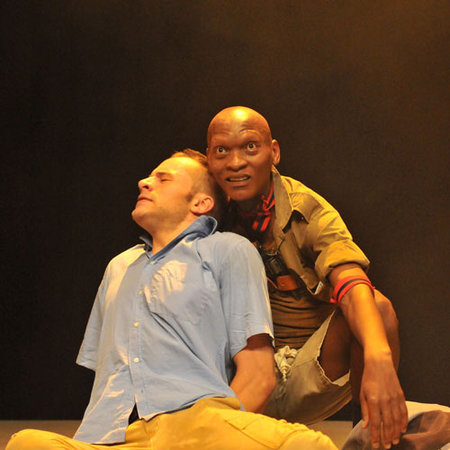Text
#voicesfrom
The coronavirus, art and culture in South Africa: a reflection by Mike van Graan
We are into the third week of our hard lockdown in South Africa. Only essential workers are allowed outside to work. The rest of us are required to stay indoors, permitted out only to acquire food and medicine. No outside exercise. No walking the dog. No alcohol being sold. Not even cigarettes. All of this with the aim of “flattening the curve” of infection, to provide more time for our health services to prepare for the eventual spike in critical cases.
On the eve of the Easter weekend, the President extended the lockdown for a further two weeks until the end of April. Five weeks of staying indoors. Of washing hands. Of keeping at least a metre apart. Of sanitising surfaces. All the preventative measures learned from Europe, the USA and China.
But South Africa is not Europe, nor the USA, and certainly not China. If anything, it is a microcosm of, and a metaphor for our world, deeply divided by inequality. A minority of mostly white people privileged by apartheid, and a large population of black people still struggling to overcome the social and economic backlogs of structural discrimination.
Today, there were reports of shops being looted in two townships in Cape Town as residents became frustrated with the delays in the distribution of promised food parcels.
With an official unemployment rate close to 30% and with more than half the population living in poverty, the pandemic will affect the poor the worst. The overcrowded conditions in townships as well as the lack of water are breeding grounds for community infection. Many children were dependent on – now shut - school feeding schemes for basic nutrition.
People barely have money for basic foodstuffs; sanitisers are luxuries.
The minority - the 10% of us who earn 60% of national income – largely responsible for the first wave of the pandemic in our country by importing the virus through our travels abroad, generally have spacious apartments, access to private medical care, data to keep in touch with our friends and families, financial reserves to see us through a period of unemployment, entertainment platforms and even exercise facilities at home.
Unlike most of our fellow citizens, who must now also deal with the army being deployed to enforce the lockdown, along with overzealous police. Already nine people have been killed by the state’s enforcers for the most mundane of reasons. It is the fate of the poor, already victims of structural violence, to now also to have their very lives threatened by the physical violence of the state. But then, the social conditions provoke other forms of violence too with 87,000 cases of domestic violence reported to the police in the first week of the lockdown. An average of more than 500 incidents per hour!
While the government pats itself on the back for implementing a hard lock down and “flattening the curve” before most other countries had achieved this, the pandemic storm broods in the cocktail of overcrowded social conditions, the lack of basic nutrition, an absence of income and the compromised immune systems of a large percentage of the population (South Africa has the world’s largest HIV epidemic with 20% of people aged 15-49 infected; TB – which renders its victims more vulnerable to the Coronavirus - is the leading cause of death in South Africa).
After the bloodless shift from apartheid to a non-racial democracy, South Africans think of ourselves as exceptional and so there is a kind of gung ho bravado in some quarters about how we are going to be beat this pandemic too! On the other hand, there is also a sense among many who live in poverty that they have little to lose; the spectre of death is so ever present from disease, from criminal violence, from starvation and the like, that the threat from a virus whose presence is relatively invisible because of limited testing, is hardly a cause for being any more concerned than usual.
Of course, there have been impressive interventions from the state, from the private sector and from ordinary citizens. A Solidarity Fund has been established to help mitigate the losses by small businesses and the self-employed. Networks have been formed in well-off suburbs to partner with less-resourced townships to channel food, medical equipment and funding as required. A few billionaires have each contributed huge amounts to mitigate the economic and social hardships caused by the lockdown. The cabinet and other politicians have committed a third of monthly salaries to the Solidarity Fund (in support of those who have no salaries!). There are the beginnings of mass rollouts of testing, of making medical facilities available closer to where poor people live, of scientists and experts informing policy, of political will suddenly being shown in addressing this deadly pandemic. One can only wonder about what a better position we would be in to fight this virus now if the same political will and energy had been spent on correcting apartheid’s social and economic disparities over the last twenty-six years, rather than on promoting and defending a corrupt, politically-connected elite!
But what of the arts in all of this? What has become of the creative sector?
A graphic doing the rounds on social media at the moment shows the medical supplies and services industry at the top of 14 economic sectors in this time of crisis, with the tourism and leisure industries (which include the arts) at the very bottom. Most sectors of the economy are taking strain with much talk of a looming recession that will be historic in its proportions. But the arts, generally a vulnerable sector within South Africa, and more so across the African continent where there is limited public funding and with small creative industry markets, are taking even more strain now. The Solidarity Fund is unlikely to support the arts and even the limited funds made available through the Department of Sports, Arts and Culture to provide some relief to the sector, have been proscribed severely in terms of who may benefit.
And yet, the arts are one of the key ways to help people get through the lockdown, with online movie platforms, music to dance to at home, poetry being shared, recorded plays being streamed, concerts livestreamed from musicians’ lounges, literary readings by authors, online exhibitions and the like. In a deeply ironic twist, the legitimate resistance of artists’ to being paid in ‘exposure’ rather than hard cash, has dissipated as artists ‘expose’ their creative work, with limited mechanisms to monetise such exposure at the moment.
The premiere of a new work and four other plays of mine, mostly produced by young, independent companies, have been cancelled or postponed indefinitely, with dire consequences for the actors and technical crew. I am in the process of raising funds – generally through selling tickets to future shows – to provide some support over the next four months to the ten people affected by this.
It is too early to determine the long-term impacts of COVID-19 on the arts, but even now, the crisis invites us to reflect on at least five themes:
- Precisely because the arts are so perpetually vulnerable and in ‘crisis’ mode, they will survive through this crisis too, because of the talent, energy, passion and sheer hard work of the creators. But as we are having to confront the existential challenges of the coronavirus, it is a time for the arts – perpetually faced with its own existential challenges - to more vigorously to mirror and rigorously examine the other existential challenges of our times: inequality (and the potential conflicts it breeds), climate change and continued nuclear proliferation.
- With the general marginalisation of the arts sector generally, there is a tendency within the sector to revel in the experience and status of victimhood. Yet there are many in our society in far worse positions than us as creative practitioners. Rather than see ourselves as a separate, special sector, we need to be far more integrated into movements and initiatives that seek to change our society, and indeed our world, for the better.
- Ego and individualism are constituent parts of many artists so that organising them into networks even to advance and defend their own interests, is often the equivalent of herding cats. The global coronavirus crisis has again shown that human solidarity (e.g. Cuban doctors assisting in Italy) and co-operation are more important than ideology, and that the ‘developed’ Global North does not necessarily have all the answers. The future of humankind requires greater listening and humility on the part of those who have, for global conversations rather than isolated bubbles are essential in order to find solutions that secure the sustainable futures of all.
- The greater use of and dependence on technology at this time to distribute the arts should challenge us to reflect more on how do we increase access for everyone, to make concrete the human right for “everyone to enjoy the arts”, rather than serve those who have disposable income within the dominant, neo-liberal creative industries approach to policy. This period of lockdown would also be a period to reflect on how to reduce our carbon footprint in our festivals, our concerts, our touring exhibitions and arts programmes as part of addressing climate change.
- Finally, what are the cultural changes that we will need to undergo to sustain a healthy future? There is talk of foregoing the handshake lest it be a means of spreading the virus. But how do we need to change our beliefs, our values, our worldviews and have these reflected in our creative work as part of building a better humanity to inhabit and sustain a more just collective future? What are our human values rather than our European or African values?
The arts sector is by no means immune from the coronavirus (and not just its economic impact). As with HIV, we will lose colleagues, friends and family – what will that mean for us? How will it change our behaviour and our thinking about the legacy that we would want to leave?
It is in confronting our mortality, that perhaps we will live better, and help others to live better, longer lives too!
Mike van Graan, April 2020
Mike is an award-winning playwright, the former president of the African Cultural Policy Network and the founding Secretary General of Arterial Network. He is currently a fellow of the Stellenbosch Institute for Advanced Study (STIAS). See www.mikevangraan.co.za for more.
COVID-19 currently has us all in its grip. We will therefor mainly use our contacts and share reports on the situation of people living in countries that are sidelined in the media and which, as it often does, are rarely heard or seen. We will also do it because people in low-income countries will be hit hardest by the pandemic!
#voicesfrom #covid19 #vidc #kultureninbewegung

